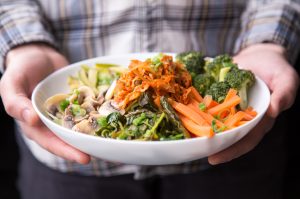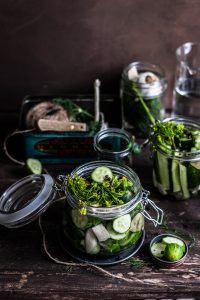Gut issues are something that plague a lot, if not all of us at some stage of life. Whether it is travellers diarrhoea, a tummy bug, IBS or something more serious, our gut plays a key role in our overall health and it’s pretty complicated science. So here is a little overview of top gut health foods and some science that I think is pretty fascinating.
Gut-Brain Cross Talk
We all know that our brain send signals to our guts. When you are hungry or about to eat, the brain sends signals so the gut can get ready and start the necessary secretions.
However the gut also has an impact on the brain and a control centre of it’s own. This is known as a the Gut-brain axis. You will know that if you feel anxious or stressed it can have an impact on your tummy. You may feel this as butterflies or have an upset tummy before a job interview for example. Or have a gut feeling on something – this isn’t made up! Some people can be more sensitive to their guts than others, but in terms of health conditions there are some foods that we can eat to help our guts.
Research has shown that stress, anxiety and disease states affect the balance of bacteria and microbes in the gut. This could be an illness or something like a job stress or family event. For some this will not be lasting, but for some it is. As an example my boy had a stomach bug and this led to lactose intolerance which is usually transient and passes after a few weeks, for him it has lasted but I hope as he grows older it will pass.
Some people seem more resilient than others. Having a health gut microbiome could help with this, we don’t currently know but research is being conducted on this. It makes sense though that eating well is a logical step.
What is the Microbiome?
Microbiome – collect of bacteria, fungi, viruses and microbes plus their genetic material that are inside the intestines. The microbiome contains 10x more microbial cells than all the humans cells in the body.
Good Gut Foods:
A top tip I heard recently from Dr Megan Rossi is to aim to eat 30 plant based foods a week. This includes wholegrains, nuts, seeds, fruit and vegetables. I counted mine up and I think I’m hitting 20 different types so have some work to do! If like me, you aren’t at the 30 mark then try adding in one new plant based food a week. Whenever you shop you could take a look at something different in the veggie aisle you don’t usually buy. I’ve started growing different veggies to make us used them and try new recipes. You want different colours and different types to get the range of prebiotics, fibres and antioxidants too.

Fermented Foods:
I’ve been working on incorporating these into my own diet more as I’ve have a gut condition and when it is flared up it usually reminds me to attend to my gut microbiome.
Foods that I try to make at home are live yoghurt, sometimes kefir and sourdough bread (if I am in a baking mood as it takes a while). Right now I’m in yoghurt mode. I heat the milk until I can just keep my finger in for 30 seconds. Then let it cool for a couple of minutes, stir in 3 tbsps of live yoghurt and leave it in a thermos flask (I have this one – but I don’t use their sachets) or somewhere warm for 8-12 hours. I like mine thick so leave it 12 hours. I used to make yoghurt years ago as a student using a pyrex jug, leaving it covered with a tea cosy on the parcel shelf of my car in the sun! You can also buy Kefir in a lot of places and there are plenty of other fermented foods to try.

| Fermented Foods |
| Kefir |
| Kombucha |
| Live yoghurt |
| Sauerkraut |
| Kimchi |
| Dry fermented sausage |
| Miso |
| Pickled foods |
Probiotics:
Theses are the beneficial microbes that can help health benefits and alter your microbiome. They are known as live cultures in foods. For example live yoghurt. Now whilst they can be bought as a supplement the problem is unless you know exactly which ones you need in your body you don’t know which ones to take. There is a probiotic guides that show the strains used in research studies that give benefits in different conditions, which can be useful when you need an idea of what to take, the amount and for how long. But we definitely need more research to enable us to be more specific.
Prebiotics:
These are foods for the gut bacteria. Fibre, polyphenols and inulin being examples of the nutrients that help. There are loads of prebiotic foods and it is likely you are already eating some. They are the plant based foods – so increase these in your diet and you will be helping your gut. Examples include Jerusalem artichokes, garlic, onion, asparagus, legumes, leeks, bananas, apples, oats, barley, flaxseeds and even seaweed.
If you want to read a more in depth article that I have written for a nutrition magazine on this topic then do take a look here:
Issue 126 fermented foods IBS and microbiome
